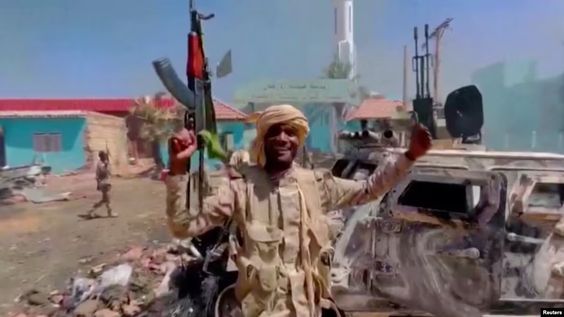Africa
Western cities of Sudan are being attacked as the war spreads

As the number of people who have fled their homes surpassed two million, fighting erupted in a number of vulnerable cities in western Sudan on Wednesday, escalating the country’s nearly two-month-old war.
A humanitarian crisis has been brought on by the conflict between the army and the paramilitary Rapid Support Forces in Khartoum as well as major cities in the Kordofan and Darfur regions.
The expanding fighting poses a risk of escalating the conflict and attracting both outside actors and armed groups, particularly those with tribal ties.
West Darfur state governor Khamis Abbakar demanded international intervention in what he called a “genocide” while speaking to Al-Hadath TV from El Geneina amid gun and artillery fire.
“Civilians are being killed in large numbers and at random,” he declared. He claimed that although the attacks had initially been focused on El Geneina neighborhoods where Masalit tribe members lived, they had now spread to the entire city.
He continued, “We have not seen the army leave its base to defend people. According to activists, 1,100 people have died in the city so far.
Since the early 2000s, when attacks by Arab militias known as the Janjaweed resulted in millions of people being displaced and 300,000 deaths, there have been conflicts in the Sudanese region of Darfur. Out of those groups, the RSF developed, and in 2017 it was recognized as a legitimate governmental force.
According to a spokesperson, Antonio Guterres, secretary-general of the United Nations, is “extremely concerned” about reports of sexual assault and the growing ethnic component of the violence. Volker Perthes, his special representative in Sudan, attributed the violence to “Arab militias and some armed men wearing RSF’s uniform.”
The RSF described the fighting in El Geneina as a tribal conflict in a statement, attributing the outbreak of hostilities to the previous government of the nation. It claimed to have made efforts to deliver aid to the city.
Numerous cease-fire violations have caused diplomatic efforts spearheaded by the United States and Saudi Arabia to fail. Senior U.S. State Department officials stated on Tuesday that a new strategy was being thought about for the upcoming days.
Darfur is a war zone.
A local organization keeping track of the fighting, the Darfur Bar Association, reported on Wednesday that civilian homes in Nyala, the capital of South Darfur, had been hit by artillery strikes after RSF soldiers complained about not getting paid.
Salah Alamin, 39, stated that “the assault could resume at any time; we don’t feel safe.”
The association claimed that the city of Zalingei, the capital of Central Darfur, was under siege. Although there has been less activity in El Fashir, the capital of North Darfur, there has been a wave of emigration from Kutum, which is under RSF control.
Meanwhile, El Obeid locals reported that the army had started launching air and artillery strikes against RSF positions in North Kordofan’s hub between Khartoum and Darfur. In order to protect the region from armed gangs, the RSF agreed to control the roads leading out of the city.
As Abdelaziz al-Hilu’s rebel allies surrounded Kadugli in South Kordofan, the army repelled an RSF attack on one of its bases. Sources from SPLM-N, al-Hilu’s faction, claimed that their goal was to defend civilians from armed militias.
On Wednesday, residents of Omdurman and neighboring Khartoum reported clashes as well as air and artillery strikes in the city’s southern and eastern neighborhoods.
Over 500,000 people had left the country, according to the U.N., and 1.7 million people had been internally displaced.
The Hajj pilgrimage to Mecca began as some people tried to regain some sense of normalcy, and middle school students in army-controlled Port Sudan started their final exams.
Since fighting over the RSF’s incorporation into the military started on April 15, according to the Sudanese Doctors Union, at least 958 people have died.
